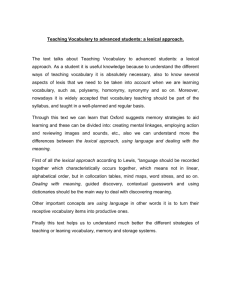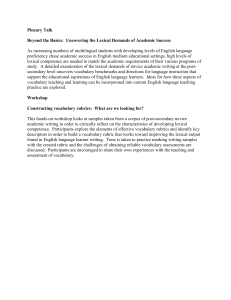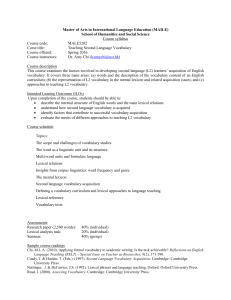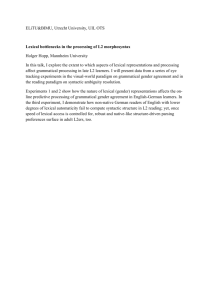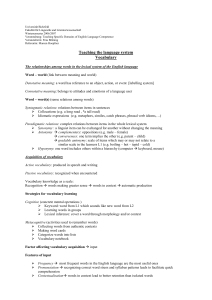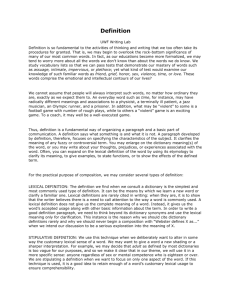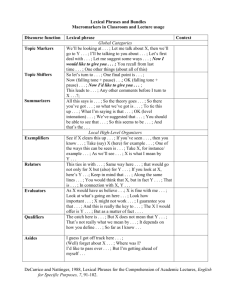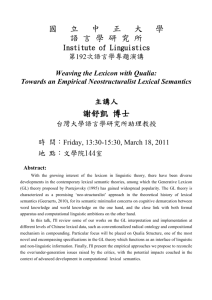1 Introduction
advertisement
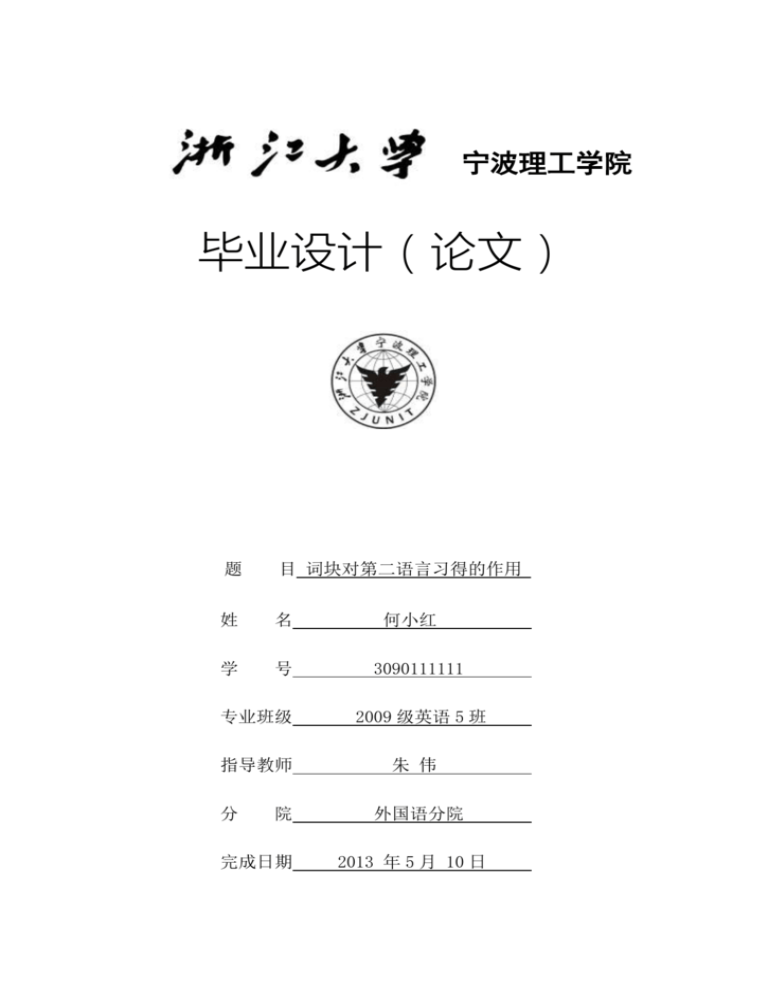
宁波理工学院 毕业设计(论文) 题 目 词块对第二语言习得的作用 姓 名 学 号 专业班级 指导教师 分 院 完成日期 何小红 3090111111 2009 级英语 5 班 朱 伟 外国语分院 2013 年 5 月 10 日 The Role of Lexical Chunks in Second Language Acquisition By He Jiaolong Student Number: 3090111111 Supervisor: Zhu Wei A Thesis Submitted in Partial Fulfillment of the Requirement for the Degree of Bachelor of Arts in the School of Foreign Language Studies, Ningbo Institute of Technology, Zhejiang University May 10, 2013 Abstract From the view of traditional pedagogy, language acquisition is the mastering of grammar and accumulation of individual word, while the vocabulary has been seen as peripheral to language acquisition. ... … Being a major factor in the depth of vocabulary knowledge, lexical chunks have come to linguistic attention in language teaching and learning in recent years. … ... ... … Keywords: lexical approach; lexical chunks; L2 acquisition 摘要 依据传统教学法,语言学习被认为是对语言规则的掌握和单词的积累,而词 语在语言中的重要作用却被严重忽视。…… 随着对其研究的深入,词块在语言教学中愈加受到关注。…… …… 关键词:词汇法;词块;第二语言习得 Contents 1 Introduction ................................................................................................................................... 1 1.1 Research Background ........................................................................................... 1 1.2 Research Purpose ................................................................................................. 2 2 The Lexical Approach ................................................................................................................ 2 2.1 Lewis’ Lexical Approach ...................................................................................... 2 2.2 Nattinger & DeCarrico’s Lexical Approach ......................................................... 2 3 The Basic Concepts of Lexical Chunks ............................................................................... 2 3.1 Definitions of Lexical Chunks.............................................................................. 2 3.2 Classifications of Lexical Chunks ........................................................................ 2 3.3 Functions of Lexical Chunks ................................................................................ 2 4 The Role of Lexical Chunks in L2 Acquisition................................................................. 2 4.1 Lexical Chunks and Output Fluency .................................................................... 8 4.2 Lexical Chunks and Native-like Selection ........................................................... 8 4.3 Lexical Chunks and Pragmatic Consciousness .................................................... 8 4.4 Lexical Chunks and Learning Motivation ............................................................ 8 5 Conclusion....................................................................................................................................... 9 References .................................................................................................................................. 10 Appendix....................................................................................................................................... 11 Acknowledgements ................................................................................................................... 12 The Role of Lexical Chunks in Second Language Acquisition 1 Introduction 1.1 Research Background In the field of EFL teaching, increasing attention has been paid to vocabulary teaching and learning since 1970s. … … However, vocabulary has been traditionally thought as individual words and seen as peripheral to language acquisition. … … Although studies on lexical chunks have gained growing favor abroad, it remains a novelty in China. Up till now, researches carried out concerning the effect of lexical chunks on language acquisition is till rare in China. The main reason is that in China, grammar structure is still emphasized in English teaching, while the Communicative Approach is enjoying the popularity. A lot of teachers have not paid special attention to lexical chunks, let alone the students. Conscious awareness of the lexical nature of language should be raised in both teachers and students Widdowson has found that the most common form of vocabulary in the authentic language situation is lexical chunk[1]. Pawley and Syder also considers these fixed or semi-fixed prefabricated language structures as the minimal unit for language communication[2]. Weinert proposes that Lexical Approach is a compromise, which not only emphasizes grammatical structure but also highlights fluent communication as well[3]. ... ... Grammar, as the generative rules, has been recognized for a long time as a frame of a language, which is the center of a language and has the power of generation[4]. Emerged in 1970s, Communicative Approach argues that language may be learned as a tool for communication, not as an academic subject focused on grammar. It attaches much importance to success of communication[5]. But the Communicative Approach has its disadvantage, just as Widdowson argues that the Structural Approach accounts for one aspect of competence by concentrating on analysis but does so at the expense of access, whereas Communicative Approach concentrates on access to the relative neglect of analysis[1]. Findings in children’s natural language acquisition indicate that children acquire their native language with a considerable quantity of lexical chunks [6]. … From the 1 The Role of Lexical Chunks in Second Language Acquisition view of Lewis, “the grammar and vocabulary dichotomy is invalid for language”[7]. ... In their book Lexical Phrases and Language Teaching, Nattinger and DeCarrico present their teaching approach applying lexical chunks, which are described as a multi-word lexical phenomenon. They believe that the “Lexical Approach avoids the shortcomings of relying too heavily on either theories of linguistic competence on the one hand, or theories of communicative competence on the other” [8]. … … 1.2 Research Purpose Lexical chunks are the essential content and ideal units for language teaching. ... … The thesis tries to convey the significant role of lexical chunks in L2 acquisition, hoping that it could do some help to raise the awareness of lexical chunks for both teachers and students. 2 The Lexical Approach 2.1 Lewis’ Lexical Approach ... … Michael Lewis proposed the Lexical Approach in his book of The Lexical Approach in 1993. … The central idea behind the Lexical Approach is stated immediately in the book – “language consists of grammaticalized lexis, not lexicalized grammar” [9]. The lexis here refers to the concept “lexical chunks”, which comprises the core of Lexical Approach. ... … 2.2 Nattinger & DeCarrico …… 3 The Basic Concepts of Lexical Chunks 3.1 Definitions of Lexical Chunks ... Luo, Liang and Lu have mentioned that a chunk is a prefabricated and frequently used collection of words, which is rather stable in meaning [10]. ... 2 The Role of Lexical Chunks in Second Language Acquisition According to Jespersen, lexical chunks are “a cover term for ready-made constructions which can be used without having to be built up from scratch” [11]. … The role of lexical chunks in language acquisition is much highlighted, while Moon is interested in the configuration of lexical chunks and holds that they are much constructed from fixed expressions. He defines the lexical chunks as “vocabulary items which consist of a sequence of two or more words” [12], which semantically or syntactically forms a meaningful and inseparable whole. ... …… … 3 The Role of Lexical Chunks in Second Language Acquisition References [1] WIDDOWSON H G. Knowledge of language and ability for use [J]. Applied Linguistics,1989 (2): 128-137. [2] PAWLEY A, SYDER H. Two puzzles for linguistic theory: Native-like selection and native-like fluency [C]. RICHARD J, SCHMIDT R (eds.). Language and Communication. London: Longman. 1983: 58-70. [3] WEINERT R. The role of formulaic language in second language acquisition: A review [J]. Applied Linguistics. 1995 (2): 180-205. [4] ELLIS R. Second language acquisition [M]. Shanghai: Shanghai Foreign Language Education Press,2000: 25-26 [5] KRASHEN S D. Principles and practice in second language acquisition [M]. Oxford: Pergamon Press,1982: 101-103 [6] SAFFRAN J R,SENGHAS A,TRUESWELL J C. The acquisition of language by children [DB/OL]. http://www.waisman.wisc.edu/infantlearning/publications/PNAS.pdf, 2001-09-06 [7] LEWIS M. Implementing the lexical approach: Putting theory into practice [M]. Hove: Language Teaching Publications,1997: 81-82 [8] NATTINGER J R,DECARRICO J S. Lexical phrases and language teaching [M]. Oxford: Oxford University Press,1992: 15-17 [9] LEWIS M. The lexical approach [M]. Hove: Language Teaching Publications, 1993: 72-73 [10] 罗凤文,梁兴莉,陆效用. 词块教学与外语学习者语言输出[J]. 山东外语教 学, 2002 (6):36-42. [11] JESPERSEN O. The encyclopedia of language and linguistic [M]. Oxford: Pergamon Press, 1982: 205 [12] MOON R. Vocabulary connections: Multi-word items in English [C]. SCHMITT N,MCCARTHY M J (eds.). Vocabulary: Description, Acquisition,and Pedagogy. Shanghai: Shanghai Foreign Language Education Press, 1997:98-110. 4 The Role of Lexical Chunks in Second Language Acquisition Appendix A Survey on English Vocabulary Learning 1. Why do you learn English? a. Communication with foreign friends b. For knowledge c. Finding a good job d. Passing an examination e. Travel f. Interesting in English itself g. Interesting in the English – speaking culture h. For receiving praise from parents or teachers i. Others … 5 The Role of Lexical Chunks in Second Language Acquisition Acknowledgements I would like to ... … Meanwhile, ... 6
